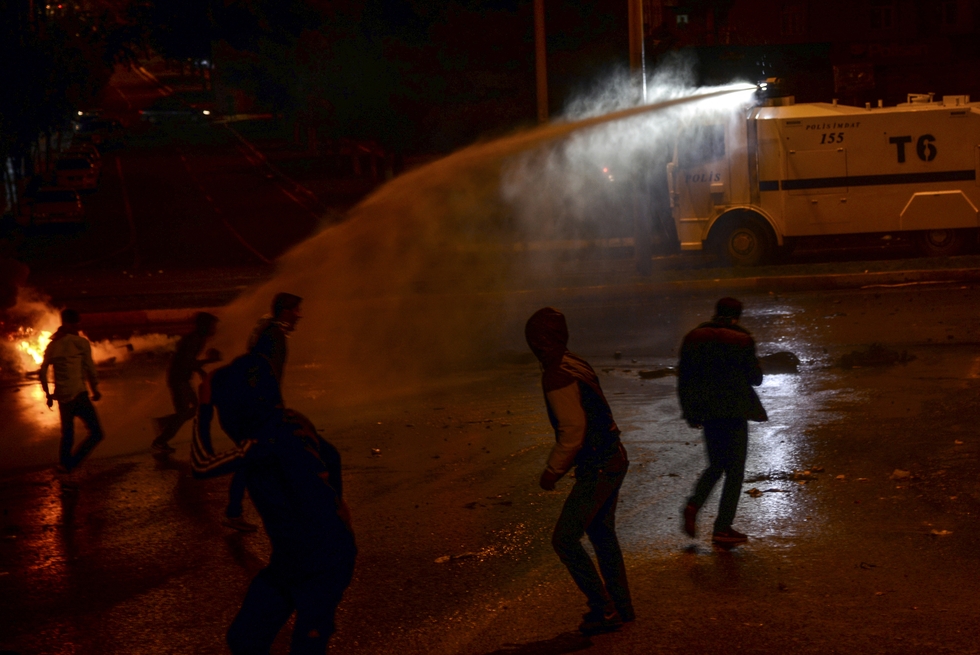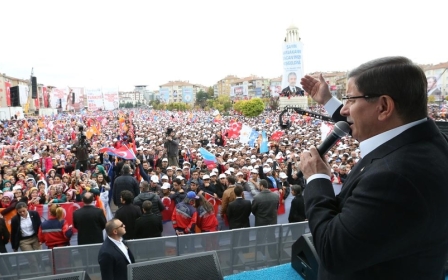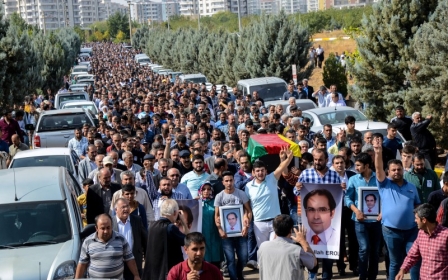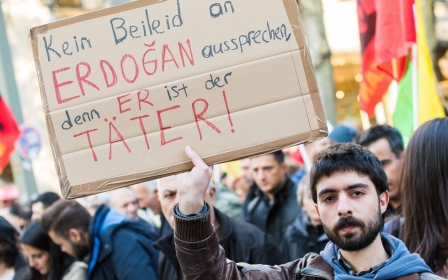Violence erupts in Kurdish areas following AKP electoral victory in Turkey

Violence broke out in Turkey's restive southeast following the unexpected electoral victory of the Justice and Development Party (AKP), who scored a surprising electoral comeback on Sunday, regaining its parliamentary majority in a poll seen as pivotal for the future of the troubled country.
A blast occured in the southeastern town of Nusaybin on Sunday evening, leaving one man dead and 25 injured, according to the pro-Kurdish Firat News Agency.
No-one has so far determined the cause of the explosion, which happened at a market in the Yeni Turan neighbourhood.
Clashes between Turkish police and activists in the Kurdish-majority city of Diyarbakir followed the announcement of the electoral results, with many angry at the loss in support for the pro-Kurdish People's Democracy Party (HDP) and accusations of voter fraud.
The clashes erupted outside the HDP headquarters, with riot police responding with tear gas and water cannons.
'A day of victory'
The AKP, founded by President Recep Tayyip Erdogan, won over 49 percent of the vote to secure 316 seats in the 550-member parliament with nearly all votes counted, enough to form a government on its own.
"Today is a day of victory," a beaming Prime Minister Ahmet Davutoglu told a crowd of jubilant supporters in his hometown. "The victory belongs to the people."
He appealed for unity in the country, destabilised by renewed Kurdish violence and bloody attacks against leftists, and facing escalating concerns about the faltering economy and what critics say is Erdogan's increasingly authoritarian rule.
"Today there are no losers but winners," he said. "We are coming to rebuild a new Turkey along with each and every citizen."
Opinion polls predicted a replay of the 7 June election results, in which of the 16 parties registered to contest the election only the three major parties and the pro-Kurdish Peoples' Democractic Party (HDP) were expected to pass the 10 percent threshold and gain seats in the assembly.
"Our people clearly showed in the 1 November elections that they prefer action and development to controversy," President Recip Tayyip Erdogan said in a statement giving his first reaction to the election result, adding that voters had backed "unity and integrity".
It is a huge personal victory for Erdogan who may now be able to secure enough support for his controversial ambitions to expand his role into a powerful US-style executive presidency.
Electoral results
This time round the HDP, led by co-chairs Selahattin Demirtas and Figen Yuksekda, lost support but appeared to have scraped over the 10-percent threshold to stay in parliament.
Demirtas said it was not a "fair election" after his party halted campaigning in the wake of the bombings, believed to have been carried out by the Islamic State (IS) group, that targeted pro-Kurdish activists in Ankara in October.
"But it's still a big victory, we have lost one million votes but we have stood tall against this policy of massacres and fascism," he said.
The main opposition Republican People's Party (CHP) scored about 25 percent of the vote, similar to its June result.
Kurdish conflict continues
Analysts said voters had turned away from nationalist and Kurdish parties.
"Erdogan rode the wave of violence back to power," said Aykan Erdemir of the Washington-based Foundation for Defense of Democracies (FDD) and a former Turkish opposition MP.
A report by the Brookings Institution think-tank had warned that whatever the outcome, "the challenges facing Turkey are growing by the day".
The political landscape has changed dramatically in Turkey since June, with the country even more divided along ethnic and sectarian lines.
Many Turks fear a return to an all-out war with Kurdistan Workers' Party (PKK) rebels after violence shattered a 2013 truce in July, just a month after the HDP won seats for the first time and denied Erdogan's AKP a majority.
The threat of religiously fuelled violence has also overshadowed the elections after a string of attacks blamed on IS, including the twin suicide bombings on an Ankara peace rally last month that killed 102 people - the bloodiest in Turkey's modern history.
Support for the Nationalist Movement Party (MHP) fell to around 11 percent, with commentators suggesting its voters shifted to the AKP.
Middle East Eye propose une couverture et une analyse indépendantes et incomparables du Moyen-Orient, de l’Afrique du Nord et d’autres régions du monde. Pour en savoir plus sur la reprise de ce contenu et les frais qui s’appliquent, veuillez remplir ce formulaire [en anglais]. Pour en savoir plus sur MEE, cliquez ici [en anglais].




